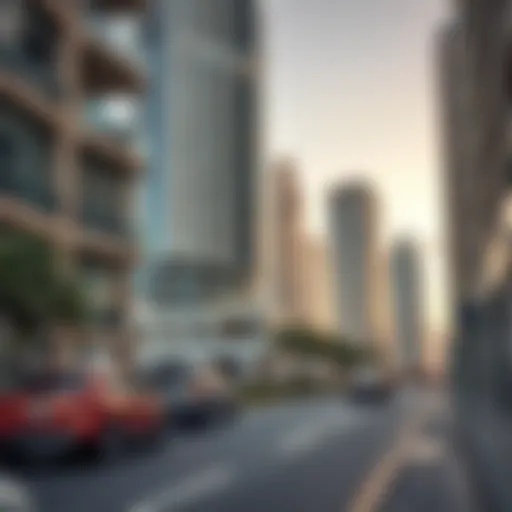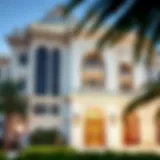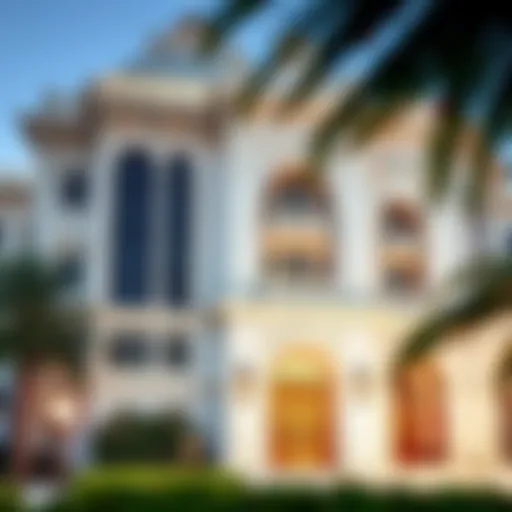Top Schools in Dubai: An In-Depth Overview
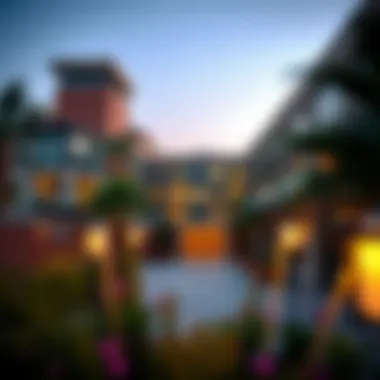

Market Trends and Analysis
Current Market Overview
In recent years, Dubai's educational landscape has undergone a significant transformation, making it a pivotal hub for quality education in the Middle East. With a blend of local and expatriate populations, the demand for diverse schooling options has skyrocketed. Parents are increasingly discerning, seeking institutions that not only focus on traditional academics but also emphasize holistic development. This growing appetite for quality education is reflected in enrollment numbers that continue to rise, indicating a robust market ripe for exploration.
Schools in Dubai offer a plethora of curriculums—including the British, American, and International Baccalaureate. Some schools even provide a unique fusion of these methods, catering to the varied needs of families from different cultural backgrounds. This variety creates a dynamic educational marketplace, making it crucial for stakeholders to stay informed of ongoing trends.
During the last decade, the landscape has shifted notably, with many new institutions sprouting up—each touting its unique features and programs. As a result, parents now have a wealth of choices, equipping them with the necessary tools to make informed decisions. Market reports indicate that parents are prioritizing factors like curriculum quality, extracurricular offerings, and the school's overall reputation when selecting a school.
Future Projections
Looking ahead, the future of education in Dubai seems to be on a growth trajectory. With the UAE government targeting educational reform, many expect increased investments in technology and infrastructure within schools. The integration of artificial intelligence and digital learning tools is becoming a staple across various institutions, transforming traditional teaching methodologies.
Additionally, as the expatriate community continues to grow, it is predicted that demand for schools providing multicultural learning experiences will escalate. Moreover, the expansion of the city, including projects like Dubai Creek Harbour and the Dubai 2040 Urban Master Plan, is likely to spur further development of schools in strategic areas. Parents will increasingly look to newly established institutions that offer innovative programs while also adhering to local educational standards.
The evolving education sector in Dubai stands at an intersection of tradition and innovation, catering to the ever-changing needs of its diverse population.
Investment Opportunities
High-Growth Areas
Investors are taking notice of Dubai’s promising educational landscape. Areas with new residential developments, such as Mohammed Bin Rashid City and Dubai South, are attracting schools that cater to a growing population. The allure of these regions lies in their potential for high foot traffic, as families look for schools close to their homes. Moreover, established neighborhoods like Jumeirah and Emirates Hills continue to attract premium institutions focused on high-quality education.
Rental Yield Insights
For real estate investors, the burgeoning demand for schools often correlates with increased rental yield in nearby properties. Families often prefer to reside within a stone's throw of their children's schools. This preference can not only boost rental prices but drives a steady flow of demand in areas surrounding top-rated educational facilities.
By understanding the interplay between real estate and education, investors can strategically position themselves in the market, targeting areas that promise high returns in both the short and long term.
The rising educational standards and consistent demands offer a vibrant landscape for investment in Dubai's schooling environment. Being attuned to market trends will ensure stakeholders can navigate this intricate landscape effectively.
For further reading, consider checking educational resources on Wikipedia or governmental studies from UAE Government.
Discover the latest discussions about schools on platforms like Reddit or Facebook.
Peer-reviewed studies can often be located through academic databases ending in .edu, providing additional insights into education dynamics in the region.
Overview of Dubai's Educational Framework
Dubai's educational framework serves as the backbone of its rapidly evolving academic landscape. As a city that thrives on diversity, educational institutions are uniquely designed to cater to a multicultural population. The importance of understanding this framework cannot be overstated; it acts as a guiding light for parents navigating the complex choices available for their children’s education.
The system is characterized by its blend of public and private schooling options, with each offering distinct benefits and addressing different educational needs. This variety ensures that families from various backgrounds can find suitable pathways for their children, ranging from traditional local practices to international instructional methods.
Dubbed a gateway to the future, the educational landscape in Dubai is supported by several government regulations and bodies. These ensure quality control and adherence to certain standards, making it easier for parents to make informed decisions. Moreover, understanding the historical context illustrates how education in Dubai has transformed over the years, from a handful of schools to a vibrant network of institutions catering to thousands of students.
In summary, comprehending Dubai’s educational framework is critical in linking parents with the right schools, highlighting key aspects such as curriculum choices, regulatory bodies, and the types of schools available.
Historical Context of Education in Dubai
The historical progression of education in Dubai reflects the broader societal changes experienced within this bustling emirate. Initially, education was informal and largely focused on religious instruction. The need for formal schooling became evident as oil revenues transformed the economy during the 1970s and beyond. Government initiatives led to the establishment of public schools, which provided foundational education for Emirati children.
Fast forward to today, Dubai boasts a rich tapestry of educational institutions ranging from traditional schools to modern international establishments. This change corresponds with the city's growth and its reputation as a global hub for expatriates. From humble beginnings to becoming an educational hotspot, Dubai's journey highlights the rapid development and emphasis placed on providing diverse learning opportunities.
Regulatory Bodies and Their Role
Regulatory bodies like the Knowledge and Human Development Authority (KHDA) play an instrumental role in shaping the educational landscape in Dubai. Their primary function includes monitoring school performance, reviewing curricula, and improving the quality of education throughout the emirate. These organizations ensure that schools maintain high standards and provide guidance for parents to choose the right institutions for their children.
The KHDA annually publishes reports that rank schools based on various educational metrics. This transparency allows parents to make informed decisions about where to enroll their children. Additionally, schools must adhere to these regulations to remain accredited, fostering a culture of continuous improvement and accountability.
Types of Schools in Dubai
Public Schools
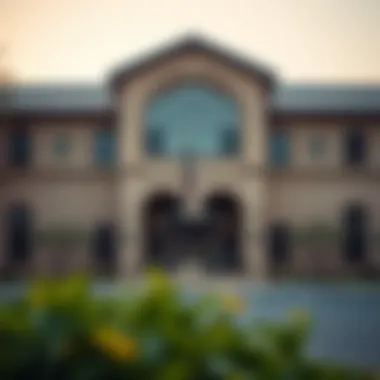

Public schools in Dubai are primarily funded by the government and offer free education to Emirati students. A key characteristic of these institutions is their alignment with the UAE’s national curriculum, which emphasizes Arabic language and culture. This focus is not only beneficial for preserving local traditions, but it fosters a sense of identity among Emirati students.
However, public schools have limited capacity for expatriate students, making them a less popular option for many non-local families. The class sizes can be larger, which can impact individual student attention. In contrast, the strong community ties and cultural instruction provide a unique advantage that resonates with local families.
Private International Schools
Private international schools represent a significant portion of the educational options available in Dubai. These institutions often utilize various international curricula, such as the British, American, and International Baccalaureate formats. The key feature of private international schools is their capacity to cater to the diverse expatriate community, enabling families to pursue educational methods familiar to them.
While these schools typically charge substantial tuition fees, they provide a myriad of extracurricular activities, enhancing the overall student experience. One disadvantage, however, could be the differing quality of education across various institutions, with some excelling in academics and facilities while others may not fare as well. Nonetheless, for many expatriates, the familiar curriculum and international environment are compelling reasons to enroll their children in these institutions.
Bilingual Schools
Bilingual schools serve a dual purpose: they emphasize proficiency in both Arabic and English, providing students with a rounded grasp of both languages. Given Dubai’s multicultural nature, these schools attract a diverse student body, bridging cultural divides through language.
The appeal of bilingual education lies in its focus on communicating effectively across cultures, which is a crucial skill in today’s globalized world. On the downside, the structure and quality of such programs can vary, leading some parents to question their effectiveness compared to purely international curricula. Ultimately, bilingual schools present a unique opportunity to appreciate local language and culture while maintaining international standards.
Key Factors in Choosing a School
Choosing the right school for your child in Dubai is a significant decision that requires careful consideration of various factors. As parents or guardians, you will want to ensure that your child's educational experience meets their needs and aspirations. Here are the key components to assess during this process:
- Curriculum Offered: The curriculum shapes the educational journey. Different curricula cater to diverse learning styles and goals, ranging from traditional to more holistic approaches.
- Location and Accessibility: A conveniently located school can save time and energy, making daily commutes less of a chore.
- School Facilities and Extracurricular Activities: Quality facilities and varied extracurricular programs can enhance a student’s overall experience and development.
- Reputation and Community Feedback: Insights from the community can provide a clearer picture of a school's strengths and weaknesses, assisting you in making an informed decision.
Curriculum Offered
When it comes to curriculum offerings, schools in Dubai provide a rich tapestry of educational frameworks tailored to meet an array of cultural backgrounds and aspirations.
British Curriculum
The British Curriculum is steeped in tradition and recognized globally. Its structure comprises both the International General Certificate of Secondary Education (IGCSE) and A-levels, promoting critical thinking and analytical skills. The assessment is largely examination-based, allowing students to build proficiency in their subjects. A notable characteristic is how it encourages in-depth studies in specific areas rather than a broad focus, making it an attractive option for many expatriates. This system also prepares students for higher education with a solid foundation in English, mathematics, and sciences.
However, some might argue that the pressure of exams can be intense for students. The preparation involved may not cater to every learning style, especially for those favoring project-based or hands-on learning activities.
American Curriculum
The American Curriculum offers a more flexible and broad-based approach, emphasizing a balanced educational diet. Students engage with subjects like history, science, and arts, and are often assessed through projects and continuous evaluation rather than exclusively through exams. Notably, this system allows for personalized learning paths, catering to varied interests and learning paces.
One drawback, however, is that this curriculum may not be recognized in certain countries as readily compared to other systems, which could pose challenges for families looking to relocate.
IB Curriculum
The International Baccalaureate (IB) Curriculum is designed for globally minded learners. It emphasizes inquiry-based learning, encouraging students to ask questions and pursue knowledge with a sense of curiosity. One of its strengths is the focus on developing critical thinking skills and international understanding, equipping students for a globalized world.
Yet, the program can be demanding, with its rigorous assessment and comprehensive requirements. It's beneficial for students who can handle pressure but might not be ideal for those who prefer a lighter load.
Other International Curricula
Apart from the British, American, and IB curricula, Dubai hosts several other international curricula, such as the French Baccalaureate and the Indian CBSE and ICSE. These programs maintain their cultural integrity while offering varied pedagogical approaches, showcasing the city’s commitment to educational diversity.
These alternative curricula can be beneficial for expatriate families wishing to maintain ties with their home nation’s educational standards. However, they may also come with limited recognition outside their national systems, creating potential challenges for continued education abroad.
Location and Accessibility
When considering schools, the geographical location cannot be overlooked. Schools in Dubai are spread across various neighborhoods, so evaluating proximity to home, traffic patterns, and public transportation options is essential. A school that is a mere hop away can make a substantial difference in daily life, reducing travel time and stress for both parents and students alike.
Additionally, accessibility features within the school can also play a vital role. Schools with transport services or ones located near major public transit routes can provide added convenience. Moreover, the local environment, including safety and community amenities, should also be taken into account.
School Facilities and Extracurricular Activities
Facilities and extracurricular offerings are paramount in defining the holistic educational experience. Schools equipped with modern technology, science labs, and sports facilities can provide students with opportunities for diverse learning experiences beyond traditional academics.
Extracurricular activities, ranging from sports teams to arts programs, can greatly enrich student life. Being involved in clubs or teams fosters social skills and personal development, cultivating a well-rounded individual. Schools that prioritize such activities often see higher levels of student engagement and satisfaction.
Reputation and Community Feedback
Verbal recommendations and community feedback serve as invaluable resources when choosing a school. Insights from other parents, former students, and local forums can paint a clearer picture of a school's culture, quality of education, and overall environment. Participating in school tours and open days also offers a firsthand experience of the atmosphere and values upheld by the institution.
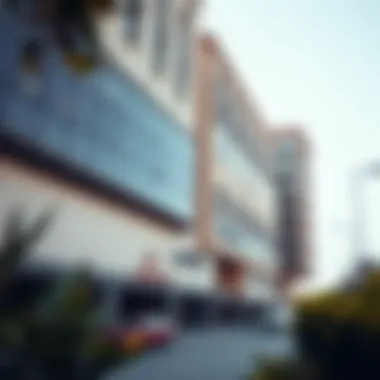

"A strong community connection often reflects the support and opportunities a school has to offer, making feedback from peers crucial to the decision-making process."
Thus, obtaining a mixture of personal testimonies and analyzing external reviews can lead to a more informed and thoughtful decision about your child's schooling in Dubai.
Top International Schools in Dubai
The realm of education in Dubai is as diverse and vibrant as the city itself, making the topic of top international schools crucial to understand for parents and guardians navigating their children's educational journeys. These schools offer a unique blend of curricula, cultural inclusivity, and opportunities for students from various backgrounds. As the expat population grows, so too does the demand for quality education that prepares young minds for global challenges. The top schools provide not just learning but also development in critical thinking, creativity, and emotional intelligence, which are essential in today’s fast-paced world.
School A: Overview and Highlights
Academics
Academics at School A are tailored to not only meet but exceed international standards. The school focuses on a student-centered approach, fostering individual learning paths. This personalized method is particularly beneficial as it addresses each student’s strengths and weaknesses. One standout feature of their academic system is the use of project-based learning, enhancing engagement and real-world skills. However, this approach might require students to adapt more quickly than standard methodologies might allow.
Facilities
The facilities at School A are second to none, equipped with state-of-the-art technology and resources. Innovative labs for sciences and creative arts programs enrich the learning experience. Many parents tout the expansive library and recreational spaces as significant advantages. Nonetheless, while these facilities draw interest, some may find the upkeep of such advanced resources can strain school budgets if not managed prudently.
Student Support
Student support at School A is extensive, with dedicated counselors and special education needs coordinators available to assist all students. The mentoring programs offered help in emotional and academic areas alike, nurturing a well-rounded development. One unique aspect is their peer mentoring system, where older students guide younger ones. This not only fosters community spirit but can build leadership skills among students, although challenges in maintaining consistency can arise.
School B: Overview and Highlights
Academics
The academic direction of School B is characterized by a robust emphasis on STEM education. The integration of technology in lessons aims to prepare students for future careers in fields lusting for skilled professionals. One notable feature is their coding curriculum, which begins as early as primary school, making it a popular choice among tech-savvy families. The potential downside is this focus might inadvertently neglect the humanities, leading to a less balanced educational offering.
Facilities
Facilities at this school are modern and thoughtfully designed. Classrooms are configured to support collaborative work, and they boast multimedia resources that enhance learning. Outdoor facilities encourage physical activities, with sports and nature spaces integrated into the school layout. However, some parents express concerns regarding the availability of adequate spaces for larger class sizes, which can lead to a more crowded environment.
Student Support
School B prides itself on its unique student support network. With a focus on mental health, the school offers workshops and seminars that empower students to discuss emotional well-being. Their proactive approach helps in creating a supportive environment. Despite this, there can be gaps in immediate access during busy times, whereby students might experience delays in support during high-stress periods.
School C: Overview and Highlights
Academics
Academically, School C offers a comprehensive international curriculum focusing on a blend of local and international perspectives. Used by many expatriates, the school fosters a broad understanding of global issues while instilling pride in local heritage. Their participatory methodology allows for an engaging learning experience. However, such an approach may not fit all learning styles, leading to some students feeling overshadowed.
Facilities
Facilities at School C cater to a growing student body and are adaptable, with a blend of indoor ecosystems for arts and sciences. A prominent culinary lab allows for unique experiential learning opportunities in food science. Yet, the balance between maintaining cutting-edge facilities and managing environmental concerns is a challenging conundrum the school faces.
Student Support
The holistic student support at School C stands out due to its commitment to inclusivity and diversity. With various programs aiming to support all students, particularly those with additional needs, parents appreciate this commitment. There’s also a strong emphasis on family involvement in educational processes. On the downside, navigation through the available support services can be cumbersome at times, potentially overwhelming families new to the system.
The role these top international schools play cannot be overstated; they are vital in shaping student experiences and outcomes, preparing them not merely for exams but for life itself.
Public vs. Private Education
Choosing between public and private education in Dubai isn't just a matter of preference; it involves weighing significant factors that can impact a child’s academic journey and family finances. This decision shapes not only the educational experience of a student but also reflects a family's values and aspirations regarding education. Each sector offers distinct advantages and challenges that families need to consider carefully.
Cost Implications
When it comes to expenses, public schools in Dubai tend to be more affordable compared to their private counterparts. Public education is primarily funded by the government, hence tuition fees are minimal. However, there are still costs to be aware of, such as uniforms, textbooks, and extracurricular activities.
In contrast, private schools can command high tuition fees, which can vary significantly based on the institution's prestige and facilities.
- Average Costs: Tuition fees for private schools can range from AED 30,000 to AED 100,000 annually.
- Additional Expenses: Transport, meals, and after-school programs can add another layer to the financial commitment.
- Financial Aid: Some private institutions offer scholarships or financial aid, but these are often competitive and dependent on academic performance or other criteria.
Thus, families must assess their budget and consider the long-term financial implications of their choice.
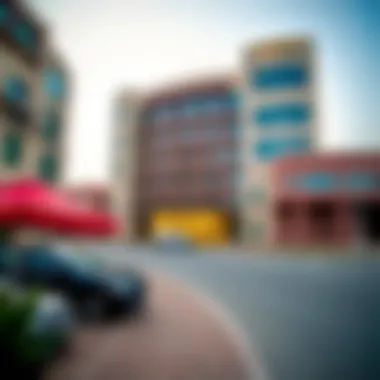

Quality of Education
Quality is yet another critical aspect when contrasting public and private education. Generally, private schools boast better resources, smaller class sizes, and a broader range of extracurricular activities. They often adhere to international curriculums like the British, American, or IB, tailored to meet diverse learning needs.
Public schools also focus on effective teaching but may face challenges such as overcrowded classrooms and limited funding. While many public schools have made significant strides in improving education quality, it can vary widely based on the school's location and facilities.
Factors Influencing Educational Quality:
- Curriculum Variability: Private schools usually offer a wider variety of curricula compared to public schools, allowing parents to choose what fits their children best.
- Teacher Qualifications: Private institutions often attract highly qualified educators because they can offer better salaries and supportive work environments.
- Resources: Access to modern libraries, labs, and technology provides private school students with additional avenues for learning.
Class Sizes and Teacher-Student Ratio
Class sizes greatly influence the learning environment and student performance. In Dubai, private schools typically maintain smaller class sizes, often ensuring a lower teacher-student ratio. This allows for more personalized attention and tailored teaching strategies to cater to individual student needs. A smaller class can also enhance student participation and foster a supportive learning community.
- Typical Ratios: In many private schools, the ratio can be as low as 1:10, whereas public schools can average around 1:25 or higher.
- Interaction Levels: More manageable class sizes in private settings often lead to increased interaction between educators and students, promoting better engagement and support.
- Impact on Performance: Research shows that lesser class sizes often translate into improved academic results, especially in critical subjects such as math and science.
The decision between public and private education ultimately balances cost, educational quality, and the environment that best suits a child's learning style.
Families should carefully evaluate their options, ensuring that factors like cost, quality of education, and class sizes align with their expectations and financial ability.
Emerging Trends in Dubai's Education Sector
In today's fast-paced world, the landscape of education continually evolves, and Dubai is no exception. As this city grows as a melting pot for diverse populations, educational institutions must adapt to meet the changing needs of students. Various emerging trends are driving this evolution, ensuring that the schools remain relevant and cater to the contemporary needs of families. Understanding these trends is pivotal for parents and guardians looking to navigate the educational maze.
Technological Integration in Classrooms
The integration of technology in classrooms is not just a passing phase; it's reshaping how knowledge is delivered and consumed. Schools in Dubai embrace cutting-edge tools ranging from interactive whiteboards to advanced learning management systems. This shift allows for a more engaging learning experience that encourages active participation among students.
- Enhanced Learning Experience: With tools like tablets and educational software, lessons become more interactive. Students can learn at their own pace, accessing resources tailored to their individual learning styles.
- Collaboration and Communication: Platforms such as Google Classroom enable better collaboration among students and teachers. Feedback can be rapid, and shared resources become easily accessible.
- Preparation for Future Careers: Familiarity with modern technology prepares students for the workplace, where digital skills are increasingly essential.
These advantages, combined with the increasing digitalization of the job market, make technology a fundamental aspect of contemporary education.
Focus on Mental Health and Wellbeing
As the conversation about mental health broadens globally, schools in Dubai are recognizing the significance of emotional and psychological support within the educational framework. It is not just about academic achievements anymore; holistic development must also prioritize mental health.
- School Counseling Services: Many schools are expanding their counseling programs to provide students with the support they need. Access to counselors helps in identifying issues early and ensures students receive appropriate care and direction.
- Stress Management Workshops: Recognizing common stressors for students, schools implement workshops aimed at teaching stress management techniques. Students learn coping mechanisms that can be beneficial not only in their academic journey but also in life.
- Balanced Curriculum: Schools are now integrating physical activities and wellness programs into their curricula, promoting a balanced lifestyle. This supports both physical health and mental clarity, essential for effective learning.
The emphasis on mental health not only fosters a supportive school environment but also builds resilience among students, equipping them to handle life’s pressures.
Sustainability Initiatives in Schools
Sustainability is not just a buzzword; it's becoming a way of life in Dubai's education sector. Schools are increasingly adopting practices that honor environmental stewardship and teach students about ecological responsibilities.
- Green School Buildings: Many new schools feature eco-friendly designs, using sustainable materials and energy-efficient systems. This approach not only reduces their carbon footprint but educates students on the importance of sustainability.
- Curriculum Integration: Environmental studies have become a significant part of school curricula. Students are encouraged to participate in projects that focus on sustainability, such as recycling and conservation efforts.
- Community Engagement Programs: Schools in Dubai are launching initiatives aimed at involving the community in sustainability efforts. Programs that invite families to participate in local clean-up campaigns or tree-planting activities foster a sense of community and shared responsibility.
"Education is not preparation for life; education is life itself."
- John Dewey
These sustainability practices help to cultivate a generation of environmentally-conscious individuals, ready to tackle global challenges.
In summary, the trends emerging in Dubai's education sector indicate a shift toward a more technologically integrated, holistic approach to learning. By emphasizing mental health and sustainability, schools are not just preparing students academically but equipping them with the skills and awareness needed to thrive in a rapidly changing world.
End: The Future of Education in Dubai
As we look towards the horizon of education in Dubai, one cannot ignore the shifting sands and the pace at which the academic landscape evolves. This city has laid out ambitions not just in infrastructure and development but in shaping minds that will lead the future. The crossroads of tradition and modernity here create a unique educational environment, fostering excellence while accommodating the diverse cultural tapestry of its student population.
Education in Dubai is evolving, and that’s crucial for several reasons. First, there is an increasing demand for personalized learning experiences. With the diverse backgrounds of students, tailored curriculums become a necessity rather than just a nicety. Schools are now investing in technology and interactive teaching methods, making learning engaging and relevant. This adaptability is essential in preparing young minds for a world that is in constant flux.
"Education is the most powerful weapon which you can use to change the world."
— Nelson Mandela
Additionally, it's worth considering the role of sustainability in shaping the future of education. As environmental consciousness grows stronger among younger generations, schools in Dubai are gradually incorporating sustainable practices and values into their curriculums. Programs that focus on environmental stewardship think beyond textbooks. Members of the school community are more often seen engaging in real-world projects aimed at improving local environments—be it tree planting initiatives or waste sorting educational workshops. Such approaches are vital as they cultivate responsible citizens who are aware of their impact on the world.
In terms of benefits, the focus on mental health and well-being within school programs cannot be overstated. More schools are starting to understand the importance of providing a supportive environment. By integrating mental health education and support systems, they address the pressing issue of student stress and anxiety, ensuring that young people are equipped not only academically but emotionally for the challenges ahead.
Time to look at some considerations:
- Global Competitiveness: With Dubai positioning itself as an educational hub, the stakes are indeed high. Schools here must ensure they are competitive with institutions worldwide. This often means ensuring academic rigor and varied options for higher education pathways.
- Community Involvement: Schools and families must maintain a synergistic relationship, fostering open communication and participation. The impact of a supportive community can be profound.
- Regulatory Adaptations: With changing educational policies and standards set by regulatory bodies, schools must remain adaptable. Keeping abreast of these changes assures both compliance and quality education.
As investments in education continue to surge and innovation takes root, the future looks promising for education in Dubai. Parents, guardians, and students can rest assured that the landscape will only enhance the possibilities available for nurturing well-rounded, innovative individuals. The synergy of tradition, technology, and sustainability is setting the stage for a brighter tomorrow, both for Dubai and, by extension, for the global community.







